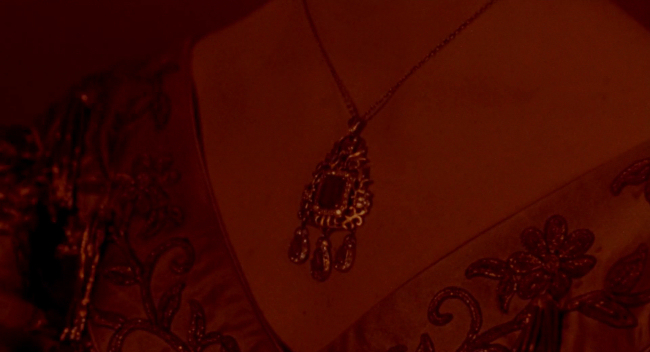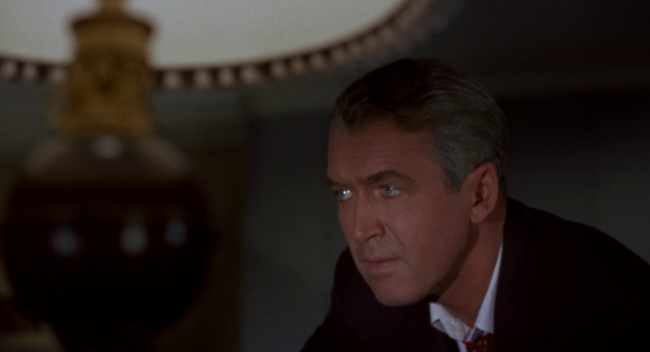
Last night I went to see the greatest movie of all time, Alfred Hitchcock's Vertigo, in a movie theatre. Well, it's the most current number one in Sight and Sound's poll of critics worldwide. It's certainly my favourite movie though I've always felt weirdly uncertain that it deserves that top spot more than Citizen Kane, partly because I know very few people who like Vertigo that much. Generally the reaction I see is people think it's okay but don't quite understand what the fuss about.
I was hoping to get some impression of the audience's reaction last night though, as it turned out, it was a blessedly quiet crowd of about twenty five people, nearly all women, ranging in age from mid twenties to mid forties, from what I could tell. Whether or not they liked the movie, they were good movie-goers who kept quiet for the most part and I was able to thoroughly enjoy the experience of the film. I wish it'd been louder, I was hoping for Bernard Herrmann's score to really blast in the opening credits but otherwise I have no complaints about how it was shown.
Fathom Events is screening Vertigo in cinemas for its sixtieth anniversary. It also happens to be the ten year anniversary of the week I spent obsessively watching it over and over before I wrote this analysis in 2008. I stand by all my opinions in that analysis and I think it's one of the best things I've written. But one of the great things about Vertigo is my perspective is different every time. Like the protagonist in Terry Gilliam's 12 Monkeys, who watches Vertigo in one scene and explains the movie is different now because he, the viewer, is different now, I find myself responding to different things.

I'm more interested in religious symbolism now than I was ten years ago and I found myself thinking about how Hellish Elster's office looks. That desk looks like it was carved from the bloody flesh of tortured souls. A lot of people talk about how green is used in the film but there's a lot to be said about its use of red, too. There's the black cherry wood in the McKittrick hotel and the intense, almost magenta wallpaper at Ernie's, the restaurant where Scottie first sees Madeleine.

When I wrote my analysis in 2008 I spent a lot of time reading what other people had written about the film and tried not to repeat anything but I'm not doing that to-day. So maybe it's already been pointed out but it occurred to me last night that Judy's fate at the end being caused by the sudden appearance of a nun may be seen as an act of God. Scottie's finally broken free of all the illusions and the manipulations to reach the moment of clarity that cures his vertigo. One could say that a benevolent God watching this said, okay, he's done enough, now I'll take Judy off the table so he won't be tempted to go back into that cycle. But there doesn't seem to be anything good in Judy's death--a repeat of her apparent death earlier in the film, it seems mainly to be confirmation that Scottie's trapped in a cycle instead of breaking free of one.

It's a deliberately frustrating and uncertain ending, not unlike the ending of the new season of Twin Peaks. In both cases, we have a detective character traversing hazards of dream and illusion in an effort to save a woman who may or may not be real, a journey that questions the criteria for what we regard as reality. Having recently watched Mississippi Mermaid, I was compelled to think of how important Vertigo was to the French New Wave filmmakers. Like Godard continually thwarting audience expectations by abrupt changes to the score in Pierrot le Fou, Hitchcock continually plays with what audiences expect from a movie and uses those expectations to make the audience a part of the story. He sets up Scottie as a hero and thus makes us complicit in his deviance, he sets up a spirit possession plot and then dashes it aside because, after all, that's a bit fantastical, right? What were we thinking?

But is Carlotta's ghost really a hoax or is its reality simply in a different and deeper form than we're conditioned to expect? The effect of Carlotta's haunting is there, the paradigm of freedom defined by the control of others is set up by her story, and the pattern of dominated people trying to dominate others has an echo in the idea of Carlotta, victim to the whims of a man in life, controlling the fates of men and women after her death. The lack of any explicit proof of her haunting, aside from possibly Scottie's attention being drawn to the necklace in his dream, is in a weird way integral to the power she asserts. Just as "Madeleine" holds so much influence for not truly existing.

Last night I was struck by this pair of shots as Judy and Scottie discuss her dream that leads them to San Juan Bautista:


Hitchcock keeps cutting back and forth between the two. Judy and Scottie are in two different places but their faces are placed in almost exactly the same relationship with the lamp. Like Scottie's dream where he falls into Carlotta's grave or when he falls onto the roof the shot seems to suggest he and Madeleine are the same person. One could say that Madeleine is the joint creation of Elster, Elster's unseen wife, Judy, and Scottie but primarily Judy and Scottie. It's like a masque written by Elster about his wife in which Judy is the actress and Scottie is the audience/participant. Or maybe more accurately, it's like a Dungeons and Dragons campaign written by Elster, Judy is the Dungeon Master, and Scottie is a player. Scottie isn't a passive audience and Judy isn't simply a performer of written lines, they're both creating the story. The lamp is a little clearer next to Judy's face but it's closer and blurrier next to Scottie's--she gives him the dream, raw material, he interprets the dream and comes up with a plan of action based on it.
Yes, I guess this movie will always be fresh for me. It was an incredible pleasure seeing it on a big screen. The incredible visuals, apart from any interpretations of them, are wonderful to experience in themselves. I love these two consecutive shots as we watch Judy and Scottie leave the forest and then we see Judy at the beach by that twisted tree:



No comments:
Post a Comment